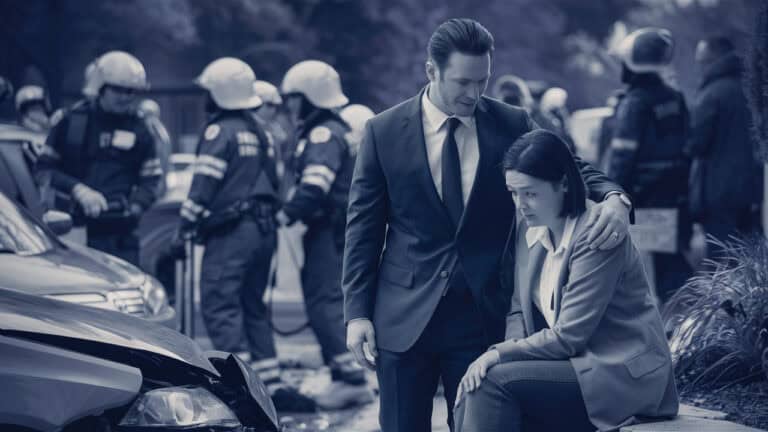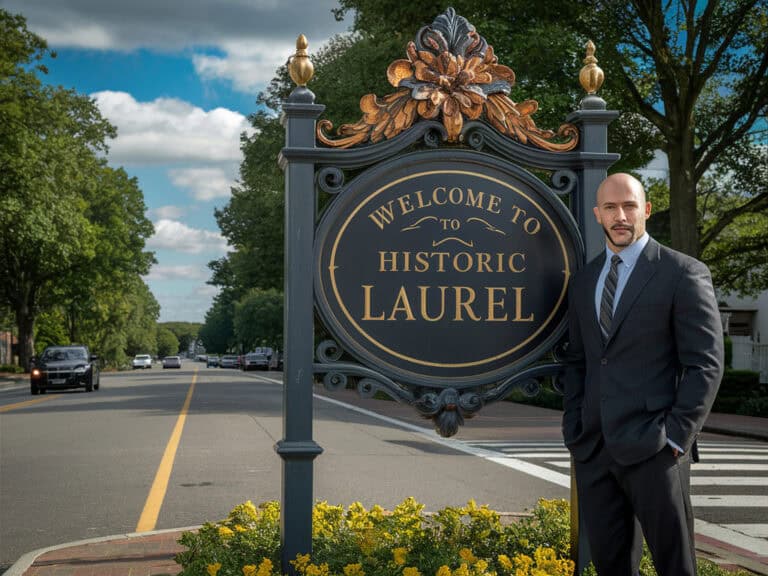Imagine the screech of tires and the jarring clash of metal. You’re in a car accident, and though you walk away without a scratch, your mind is etched with memories that replay on loop. It’s like an unwelcome shadow clinging to every step—this is post-traumatic stress disorder after a car accident.
You might feel alone, but know this: it’s not just you. Many survivors grapple with invisible wounds long after their physical ones have healed.
Stay with us because we’ll delve into what makes your heart race at the mere thought of getting behind the wheel again or why sleep doesn’t come easy anymore, especially when dealing with post-traumatic stress disorder after a car accident. We’ll tackle why a person develop PTSD and how PTSD can hijack everyday life and explore ways to reclaim control—from therapy techniques that unwrap traumatic memories like thorns from skin to legal steps for those seeking peace in Maryland courts.
This isn’t about lingering on past horrors; it’s about finding paths forward.
Table Of Contents:
- Understanding Post-Traumatic Stress Disorder (PTSD) after a Car Accident
- Recognizing the Signs and Symptoms of PTSD in Car Accident Survivors
- Seeking Help and Treatment for PTSD Following Motor Vehicle Collisions
- Treating Deep-Seated Fear After Road Traffic Incidents
- Legal Aspects and Rights to Compensation in Maryland for Car Accident-Induced PTSD
- Legal Aspects and Rights to Compensation in Maryland for Car Accident-Induced PTSD
- FAQs in Relation to Post-Traumatic Stress Disorder after a Car accident
- Conclusion
Understanding Post-Traumatic Stress Disorder (PTSD) after a Car Accident
If you’ve been through a car crash, it’s not just the physical scars that need healing. The mind can take quite the hit too. We’re talking about post-traumatic stress disorder after a car accident PTSD —a tough mental health battle that millions face each year – group therapy can help.
Defining Traumatic Stress Disorders
A traumatic event like a motor vehicle accident can leave more than dents and broken glass; it can shatter peace of mind, leading to PTSD. This is where your brain gets stuck on high alert long after danger has passed. Imagine your fight-or-flight response getting jammed in the “on” position—that’s what living with this kind of stress disorder feels like.
The American Psychological Association sheds light on PTSD as an aftermath of terrifying events—think shell shock but from road traffic nightmares instead of war zones. With 3.5 million adults grappling with PTSD annually, we see that anyone’s drive home could detour into trauma territory.
The Onset and Progression of PTSD Symptoms
Symptoms don’t always start right away—they might sneak up weeks or even months later, stealthy as shadows at dusk. And when they do show up? They bring along unwanted guests: intrusive memories so vivid you’d swear you were back in that dreaded moment all over again.
You may find yourself steering clear from roads or vehicles altogether because who wants to poke at fresh psychological wounds? That’s avoidance behavior for you—one way our minds try to put distance between us and distressing thoughts related to the traumatic incident.
Then there’s hyperarousal—feeling wired-up without any coffee in sight—and sleep dodging you like it got paid for it every time those eyes refuse to stay shut at night due to recurring nightmares about crashes yet uncrashed—an unfortunate feature among common PTSD symptoms after such life-shattering experiences. Healthline elaborates on these episodes being akin to unsolicited reruns nobody asked for—a marquee sign something isn’t quite right upstairs post-accident.
So here we are—it turns out car accidents are top contenders when playing ‘Name That Trauma’ within general non-military populations according to some American Psychological Association studies. But remember folks, despite cars being everyday objects rather than outright weapons per se—their collision course effects remain anything but mundane inside survivors’ heads.
Car accidents can cause PTSD, turning your brain’s fight-or-flight response into a relentless alarm. Symptoms like vivid flashbacks and avoidance behavior might not appear immediately but can disrupt life long after the crash. Finding balance amid these mental struggles is key while dealing with day-to-day responsibilities.
Recognizing the Signs and Symptoms of PTSD in Car Accident Survivors
Imagine your mind as a busy highway, with thoughts zipping by like cars at rush hour. Now picture an unexpected detour—this is what happens when someone develops PTSD after a car accident. Suddenly, that smooth traffic flow turns into chaos, filled with intrusive thoughts and nightmares that can pop up without warning.
Watch this car accident survivors experience below:
Navigating Through Intrusive Memories and Flashbacks
Intrusive memories are like uninvited guests crashing your mental party; they barge in when you least expect them. For survivors of vehicle accidents, these unwanted visitors often take the form of vivid flashbacks to the traumatic event itself—a sensory rerun that can be both distressing and disorienting. They don’t knock; they just burst through the door.
You might find yourself back behind the wheel or hearing screeching tires while simply watching TV or drifting off to sleep—evidence of common PTSD symptoms after a car accident taking hold. And it’s not just visual cues: smells associated with the crash scene or sounds  similar to those heard during impact can trigger these intense recollections too.
similar to those heard during impact can trigger these intense recollections too.
Understanding Avoidance Behaviors and Hyperarousal
Avoidance behaviors are another piece of this complex puzzle—like steering clear from roads where others speed nonchalantly past signs reminding us “Speed Kills.” These behaviors aren’t just about physical avoidance but also shunning conversations about driving altogether because it brings everything rushing back—the fear, pain, anxiety—all too real again.
Beyond dodging triggers lies hyperarousal—it’s akin to having an overactive alarm system wired directly into one’s nervous system. Imagine jumping out of your skin at every honk or brake squeal long after being involved in a motor collision—that jolted feeling isn’t easy to shake off for someone grappling with post-traumatic stress disorder following such incidents.
Healthline outlines how intrusive thoughts play out, describing them as unwanted thought grenades lobbed into daily life which cause significant emotional distress.
With nearly 10% of car accident survivors experiencing extreme difficulty due to PTSD—an estimate reflecting millions annually—it becomes essential we recognize its grip on everyday life.
These psychological scars have profound effects not only on individuals but their family members who watch loved ones face challenges previously unthinkable before stepping into their vehicles priorly seen as safe spaces now turned unpredictable threats.
PTSD after a car accident can throw your mind into chaos with uninvited flashbacks and hyperarousal. Steering clear of triggers is common, but these avoidance tactics show just how deep the psychological scars run, affecting millions every year.
Seeking Help and Treatment for PTSD Following Motor Vehicle Collisions
Car accidents shake up more than just metal. They can rattle your mental health, too. For some, the experience of a car accident can result in psychological distress such as PTSD. But remember, steering through this tough road is possible with the right help.
Role of Cognitive Behavioral Therapy in Healing from Trauma
Cognitive therapy turns on the headlights to show you how thoughts fuel distress after an accident. It’s like reprogramming your GPS so you don’t keep rerouting back to those traumatic moments. With cognitive therapy for PTSD, professionals guide you to challenge these patterns and plot a new course toward healing.
You’re not alone if crash-related anxiety has parked itself in your mind; many survivors face challenges like yours every day. Yet, it’s crucial to know that medical professionals are there with tools designed for PTSD treatment—tools proven effective by places we trust like Mayo Clinic. And let’s talk numbers: millions navigate these therapies successfully each year.
Exposure Therapy’s Approach to Managing Anxiety
The thought of revisiting a car wreck scene might make you want to hit the brakes hard on therapy sessions—but hear me out. Exposure therapy gradually reintroduces memories until they lose their jolt over time—think defusing a bomb before it goes off again inside your head.
This method doesn’t mean therapists will toss you into rush hour traffic straight away; rather, they’ll take baby steps alongside you as they work through intrusive memories safely and slowly—you’ve got control at all times. It’s one way that helps lessen hyperarousal symptoms so everyday life won’t feel like dodging potholes constantly.
If trauma has been hitching a ride since your vehicle accident making even short drives feel long-hauls fraught with avoidance behaviors or jumpiness—anxiety management techniques learned here could give back some peace behind the wheel.
Treating Deep-Seated Fear After Road Traffic Incidents
Moving past motor vehicle-induced PTSD may seem daunting when anti-anxiety medications only go so far—they’re sometimes part of what gets tossed into gearboxes along with group sessions or eye movement desensitization (EMDR) treatments recommended by heavy hitters such as American Psychological Association.
Digging Deeper Into EMDR’s Effectiveness Against Recurring Nightmares
EMDR therapy uses eye movements to help process trauma, drawing on the body’s own healing mechanisms. It’s a bit like how REM sleep works—it taps into our natural systems without needing high-tech gadgets.
Car accidents can trigger PTSD, but therapies like cognitive behavioral therapy and exposure therapy offer effective routes to recovery. Tools like EMDR also help process trauma safely, showing you don’t have to face this journey alone.
Legal Aspects and Rights to Compensation in Maryland for Car Accident-Induced PTSD
If a car crash has turned your life upside down, you’re not alone. Imagine this: You’ve survived the screech of tires and shattering glass, but now every honk on the street takes you back to that moment. Following a traumatic event such as a car crash, PTSD can often present itself unexpectedly.
In Maryland, the law gets it – trauma doesn’t end with physical wounds. For those who experience difficulty shaking off the mental shackles of that harrowing day, there’s hope beyond therapy sessions; we’re talking about cold hard cash in terms of car accident compensation in Maryland.
Understanding Your Right to Seek Compensation for PTSD after a Car Accident
The road to recovery is tough enough without financial strain piling up like cars during rush hour traffic. But here’s some good news: If another driver caused your motor-induced nightmare, seeking compensation for PTSD can help ease some burdens.
You see, while cuts heal and bones mend, psychological scars linger much longer—like gum stuck on hot pavement—and may never fully go away. The State understands this pain isn’t just ‘in your head’. In fact, the American Psychological Association recognizes PTSD as real as any broken bone from an auto accident.
Post traumatic stress disorder after car accident compensation is available for PTSD victims.
Navigating Legal Waters After Trauma Hits Home
Buckle up because navigating legal waters post-accident requires skillful steering through complex statutes and jargon-heavy documents—kind of like trying not to spill coffee while driving over potholes. A seasoned car accident attorney is more than just your legal chauffeur; they are navigators who chart out potential routes toward rightful restitution.
Say goodbye to generic advice leaflets or confusing DIY claim forms—you need tailored strategies grounded by expertise from someone well-acquainted with twists and turns specific to cases involving emotional trauma due to crashes on our roads or highways.
Mental Scars Matter: Valuing Emotional Distress alongside Physical Injury Claims
We all know medical bills stack up faster than dirty laundry—but did you know claims could include damages for mental health? We’re breaking barriers folks because things have changed since shell shock days when inner turmoil was brushed under rugs made outta stiff upper lips.
In today’s age where self-destructive behaviors are finally seen through compassionate lenses rather than judgmental squints, it’s crucial to seek guidance from experts. Visiting a qualified healthcare provider can be the first step towards healing and recovery.
Car crashes can leave deep mental scars, and Maryland law acknowledges this by allowing PTSD compensation claims. With an attorney’s help, you can navigate the legal maze to secure financial relief for psychological trauma just as real as physical injuries.
Legal Aspects and Rights to Compensation in Maryland for Car Accident-Induced PTSD
Maryland’s roads can be unforgiving, leaving not just physical scars but emotional ones too. Compensable emotional injuries, such as PTSD, can result from car accidents and should be taken seriously. The legal journey might seem daunting, but understanding your rights is the first step towards healing.
Navigating the Legal Labyrinth of PTSD Claims
In Maryland, if a vehicle accident throws your mental peace off-kilter, you’re not alone on this rough ride. Here’s where it gets serious: PTSD isn’t just ‘in your head’—it’s recognized by courts as a significant consequence of traumatic events like car crashes. You have every right to seek compensation for this invisible wound.
The trick? Proving that the trauma from screeching tires and shattering glass has morphed into an ongoing battle with PTSD—a fight no one signed up for when they got behind the wheel or buckled up that day.
PTSD after Motor Vehicle Accidents: What Does It Mean Legally?
Your suffering counts. In fact, under Maryland law, psychological injuries such as post-traumatic stress disorder after a car accident are viewed through much the same lens as broken bones or whiplash—you’ve been hurt due to someone else’s negligence; now let justice do its part.
A seasoned car accident attorney at Pinder Plotkin, familiar with cases like yours—where victims endure sleepless nights long after their wounds have healed—is vital here because they understand something crucial: When it comes to collision-induced traumas, this isn’t about seeking sympathy; it’s about securing what you need to piece back together both mind and life disrupted by sudden chaos on asphalt lanes.
Gearing Up For Your Claim: Evidence Is Key
To turn legal gears in favor of those haunted by memories of metal meeting metal at terrifying speeds means presenting compelling evidence—think medical records confirming diagnosis from licensed professionals versed in tackling shadowy foes like anxiety lurking post-crash…
With documented accounts, you’ll see how ordinary tasks turn into struggles with persistent, unwelcome thoughts that stem from experiencing or surviving horrific car accidents—events textbooks might describe as ‘traumatic,’ but those who’ve lived through them know as ‘nightmares.’ This tapestry of evidence is so compelling it would have Lady Justice herself nodding in agreement.
Maryland law treats PTSD from car accidents seriously, giving you the right to compensation for this ‘invisible wound’ as much as any physical injury. You’re not alone in this fight; with solid evidence and a savvy attorney, you can seek justice and start putting your life back together.
FAQs in Relation to Post-Traumatic Stress Disorder after a Car accident
What are the symptoms of PTSD after a car accident?
Symptoms often include flashbacks, nightmares, anxiety spikes, and mood swings. Some folks may avoid cars altogether.
How long does trauma last after a car accident?
Trauma varies per person; some shake it off in weeks, others grapple with effects for months or longer.
How long does it take nerves to heal after a car accident?
Nerve healing is slow-going—weeks to years—depending on damage severity and personal health factors.
How much compensation for PTSD after a car accident?
Dollars hinge on impact severity. Lawyers factor in therapy costs and lost earnings when they crunch numbers.
Conclusion
Healing starts with understanding that post-traumatic stress disorder after a car accident is common and manageable. This awareness initiates the restoration process.
Recollection leads to triumph. By remembering your triggers and symptoms, you gain the strength to confront them directly, whether through therapy or support networks, in the context of post-traumatic stress disorder after a car accident.
Confrontation leads to recovery. Facing the legal options for compensation in Maryland restores the control that trauma had taken away.
Seek assistance; seek healing. Seek professional help from cognitive therapists and others who specialize in post-traumatic stress disorder after a car accident to guide you out of its shadow and towards the light.
Your journey isn’t over; it’s just beginning anew—free from the burden of unaddressed trauma that once slowed your steps.





